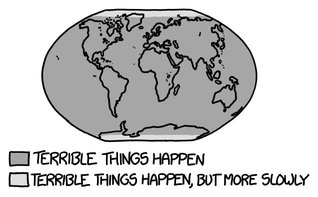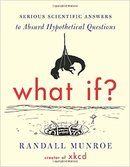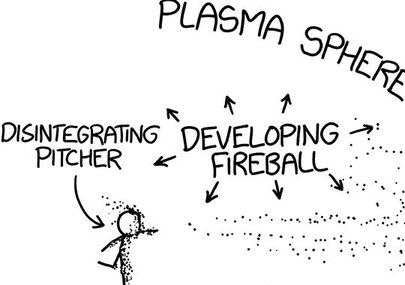One of the most interesting things about knowledge and learning is how they allow us to form conjectures, imagine possibilities, engage with the hypothetical; in other words, what we know allows us to imagine what we don’t yet know for certain. The more fanciful and strong imaginations can combine with knowledge to ponder especially perplexing matters. For example, once we’ve learned enough about science, we could look at the earth and ask, “What if it stopped spinning? What would happen?” That question happens to be the first of many discussed in What If?: Serious Scientific Answers to Absurd Hypothetical Questions by Randall Munroe.
Munroe, a former NASA employee, is already a star for his comic strip xkcd, which is one of the best online comics of all and proof that you don’t have to be a great cartoonist to make great cartoons. Munroe frequently engages with his audience in discussing how extreme scenarios would realistically play out, and in this 300-page hardcover volume, he collects questions from readers and answers them in illustrated essays. The result is a book that in some ways echoes xkcd in its artistic style, the reappearance of the strip’s central characters, and the Richard Feynman-meets-Monty Python tone. These characteristics are most apparent in twelve pages where he dismisses the most “weird (and worrying) questions” with single-panel cartoons not put on the website. The delightful surprise, however, is that the essays are outstandingly written, with the illustrations being an added bonus.
Admittedly, Munroe’s first proper book reveals some beginner’s fatigue. Near the end, typographical errors sneak in, and he quotes the same lines from Firefly twice in two different essays without acknowledging the repetition. These are mere quibbles, however, compared to Munroe’s gifts as a science writer. Discussing matters that rely on considerable knowledge of astronomy, biology, chemistry, genetics, and physics (a tall order), Munroe, like so many great teachers, conveys information in a way which makes the reader not only understand the concepts being discussed but also feel by the end he or she understands those concepts as well as Munroe. What If? is a book that makes you feel smarter.
 It’s also a book that is entertaining to read. Munroe does a terrific job of balancing questions that provoke truly thoughtful, detailed, serious answers (“What if we drained all the oceans?” “What would we see if we traveled back and forward in time while remaining in the same spot?” “What if we built an actual wall shaped like the periodic table with all the elements in their appropriate spots?”) and questions that provoke truly thoughtful, detailed, and hilarious answers. In particular, his essays on what would happen if all of humanity gathered in the same spot to simultaneously jump and if we tried to build a bridge from New York to London out of Legos are miniature comic gems, while still being firmly rooted in scientific principle. He also has talents for ending essays with the perfect closing sentences, using the term “citation needed” in a creative manner (It can be done!), and refusing to answer questions about a particular wildly-successful anime which inspired hundreds of “What if?” emails.
It’s also a book that is entertaining to read. Munroe does a terrific job of balancing questions that provoke truly thoughtful, detailed, serious answers (“What if we drained all the oceans?” “What would we see if we traveled back and forward in time while remaining in the same spot?” “What if we built an actual wall shaped like the periodic table with all the elements in their appropriate spots?”) and questions that provoke truly thoughtful, detailed, and hilarious answers. In particular, his essays on what would happen if all of humanity gathered in the same spot to simultaneously jump and if we tried to build a bridge from New York to London out of Legos are miniature comic gems, while still being firmly rooted in scientific principle. He also has talents for ending essays with the perfect closing sentences, using the term “citation needed” in a creative manner (It can be done!), and refusing to answer questions about a particular wildly-successful anime which inspired hundreds of “What if?” emails.
When all is said and done, there is one last feature of What If? tucked under the science and laughs but just as important as them. Fans of xkcd also know that Munroe can create moving comics that affect our hearts more than our minds; he references one of the best examples, “Angular Momentum” when calculating the longest possible sunset a human could see. In a similar vein, What If? is sprinkled with essays that allow Munroe to reflect on the human spirit and not just our status as a species full of DNA. (Incidentally, removing all of our DNA would rapidly kill us.) In determining the feasibility of living on an asteroid like the Little Prince, the number of possible English tweets, the time when dead people will surpass living people on Facebook, and what exactly is the full spectrum of earthquake magnitude (the closing essay), Munroe finds time to muse on how wondrous we are in our abilities to imagine, to create, to form our cultures, and to determine our own destinies in ways which have nothing to do with scientific limitation. It’s an affecting, optimistic attitude…and also a necessary one.
 At the Addison Recorder, our writers have either passed thirty (Ed. Note: I BEG TO DIFFER!!! – Travis) or are rapidly approaching the age (Ed. Note: Aw, peas. – TC). We are buying homes, engaging in long-term financial planning, having children, seeing our lives change—and there is nothing that makes a person ask more hypothetical questions — including not-so-absurd ones — than their own lives. How easy it is to wonder what could have been if you’d gone to a different college, taken a different job, not split up with that past partner. In this writer’s opinion, these quiet, human moments represent Munroe’s reminding us that asking “What if?” about our own lives is a fool’s errand. We have so much potential and are capable of so much that getting hypothetical about things that can’t happen is useless, and we should ask “What if?” about the world around us and what we are potentially capable of changing. It’s an ultimately inspiring message as much as an entertaining one.
At the Addison Recorder, our writers have either passed thirty (Ed. Note: I BEG TO DIFFER!!! – Travis) or are rapidly approaching the age (Ed. Note: Aw, peas. – TC). We are buying homes, engaging in long-term financial planning, having children, seeing our lives change—and there is nothing that makes a person ask more hypothetical questions — including not-so-absurd ones — than their own lives. How easy it is to wonder what could have been if you’d gone to a different college, taken a different job, not split up with that past partner. In this writer’s opinion, these quiet, human moments represent Munroe’s reminding us that asking “What if?” about our own lives is a fool’s errand. We have so much potential and are capable of so much that getting hypothetical about things that can’t happen is useless, and we should ask “What if?” about the world around us and what we are potentially capable of changing. It’s an ultimately inspiring message as much as an entertaining one.
(It is also this writer’s opinion that when Munroe proves the sun has still never set on the British Empire, it’s a jolly good thing.) (Ed. Note: Are you embracing imperialism? If so, Niall Ferguson is your next read. If not, er, you’re a good person. – Bean) (Writer’s Note: Imperialism is the pits, but the Victorianist in me loved it. – Andrew)





